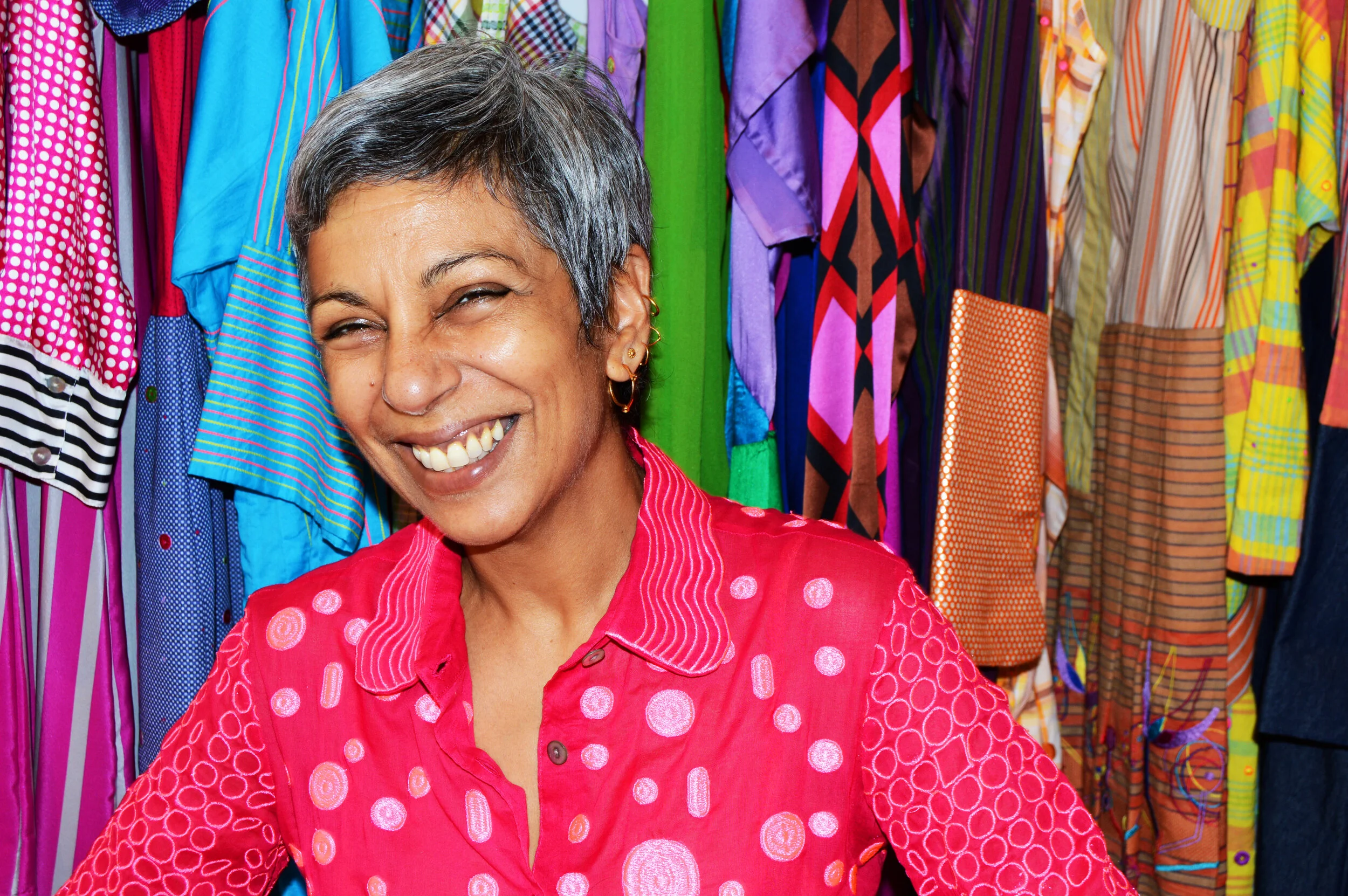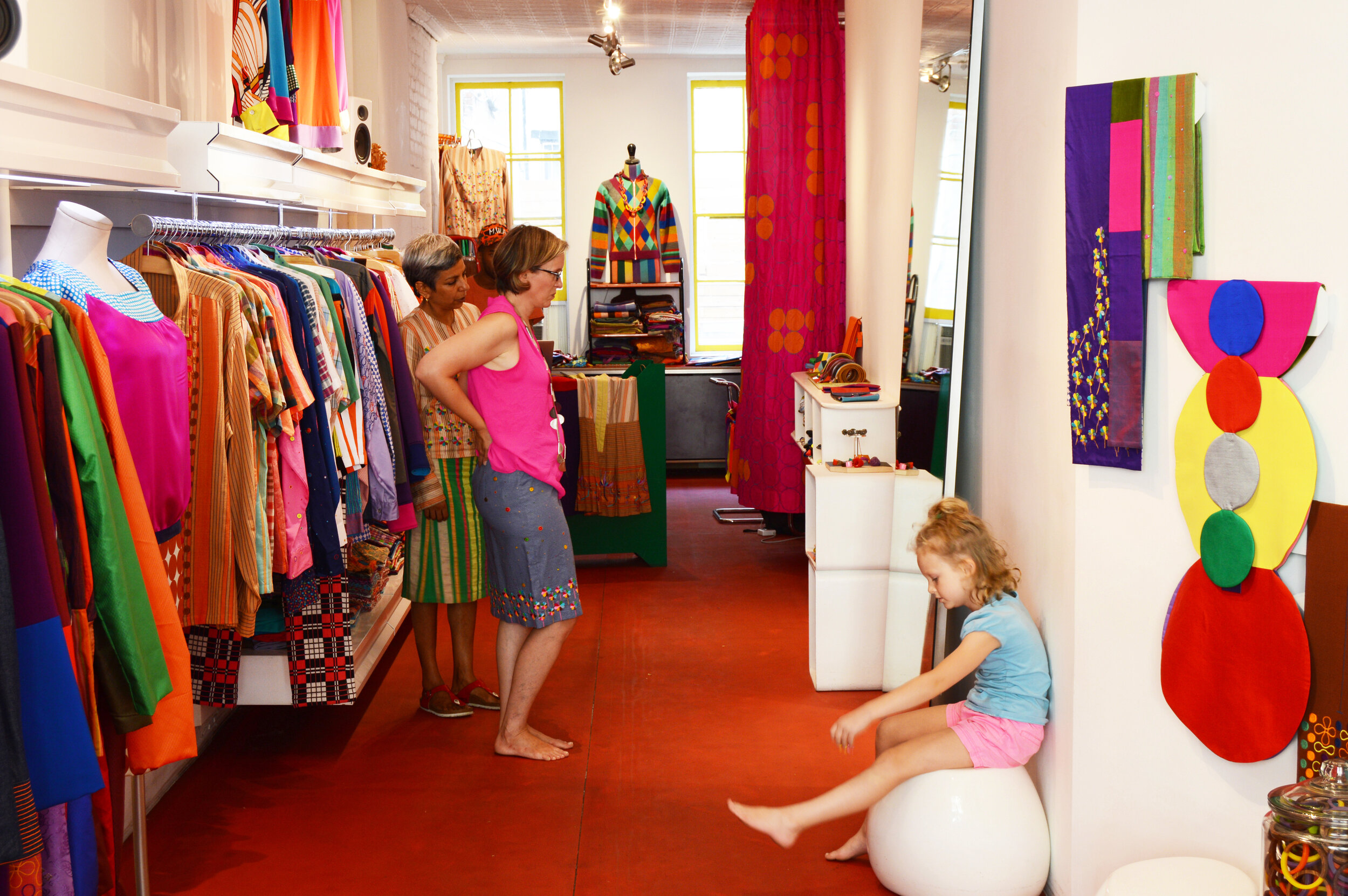The Niche Fashion Designer Who’s Maintained Entrepreneurial Longevity
Fashion designer Alpana Bawa in her New York City boutique. Photo: Nina Roberts
Published in Forbes on August 14, 2017
The entrepreneurial fashion designer Alpana Bawa has remained in business for more than 30 years in New York City. This is no small feat as emerging designers can be the hot darlings of the fashion world one moment, kicked to the curb the next. The fashion industry is notoriously fickle.
Bawa’s eponymous clothing line is known for its bold and funky mix of colors, prints, patterns and fabrics. She operates her own boutique that sells her collection, currently located in Manhattan’s NoLita neighborhood on the edge of Chinatown and Little Italy.
Donning an outfit she designed—a bright green skirt with vertical stripes paired with a fuchsia embroidered blouse—Bawa straightens out the displays in her long glass-front shop with a bright red floor. Her pieces, typically made of silk, cotton or wool fabrics, are not cheap. A dress might cost $400, a shirt $250 and a t-shirt $45, but each piece is individually constructed, the craftsmanship is exquisite.
The entrepreneurial fashion designer Alpana Bawa has remained in business for more than 30 years in New York City. This is no small feat as emerging designers can be the hot darlings of the fashion world one moment, kicked to the curb the next. The fashion industry is notoriously fickle.
Bawa’s eponymous clothing line is known for its bold and funky mix of colors, prints, patterns and fabrics. She operates her own boutique that sells her collection, currently located in Manhattan’s NoLita neighborhood on the edge of Chinatown and Little Italy.
Customer Jenny Raymond at the Alpana Bawa boutique in New York City. Photo: Nina Roberts
Donning an outfit she designed—a bright green skirt with vertical stripes paired with a fuchsia embroidered blouse—Bawa straightens out the displays in her long glass-front shop with a bright red floor. Her pieces, typically made of silk, cotton or wool fabrics, are not cheap. A dress might cost $400, a shirt $250 and a t-shirt $45, but each piece is individually constructed, the craftsmanship is exquisite.
Professionally, Bawa came of age in the 1980s in New York City. She moved from Delhi, where she grew up, to study fashion at Parsons School of Design in 1983. The city was wild, affordable and exploding with underground creativity—from the club scene and early hip-hop to the art of Keith Haring and Jean-Michel Basquiat. The infamous nightclub Area —mind-boggling because of its decadent artistry and fantastic mix of clubgoers—opened the year Bawa arrived. “I am really lucky that I was part of that,” reminisces Bawa, who frequented the city’s clubs.
Bawa’s early career is a veritable who’s who and what’s what of the 1980s downtown scene. Her first collection sold at Susanne Bartsch’s SoHo store (before Bartsch became the city’s reigning nightclub queen) where Bawa worked. Madonna purchased one of Bawa’s velvet outfits, which she wore for a photo spread in the now defunct Details Magazine. Bawa’s designs sold next to pieces by Vivienne Westwood and John Galliano, among other British designers.
An Alpana Bawa belt. Photo: Nina Roberts
Because of Bawa’s creative outfits she was soon working the door at the nightclub M.K. where she met Serge Becker, a downtown entrepreneurial figure connected to some of the city’s most renowned clubs, bars and restaurants; currently the Creative and Artistic Director of the Museum of Sex.
“I talked with Serge about wanting to start my own business,” recalls Bawa when she worked at M.K. “He gave me a check and said, ‘Okay, go do it. And you don’t have to kill yourself to return it,’ so I still haven’t returned it,” Bawa laughs. “He just believed in what I was trying to do. I don’t know if you would find that anymore,” exclaims Bawa, someone willing to fund a creative endeavor without a guaranteed return on investment.
Those formative years of the analog and affordable 80s are the ethos by which Bawa still operates as an artist and entrepreneur, despite today’s harsh economic reality. How has Bawa, who values creativity and quality over profitability, remained an artistic small business owner?
Listen To The Gut, Be Yourself
Throughout Bawa’s first twenty years, she hired and fired PR people; opened and closed retail stores. “I did fashion shows, trade shows, I’ve done it all,” says Bawa who also graced the pages of major fashion publications, from Vogue to Elle. “At the end, I just felt like I was a manager,” says Bawa. “I don’t want to be a manager, I’d rather be creative.”
At one point she began to ignore all well-intentioned advice about growing her business. “Once I stopped listening to the outside, I could listen to the inside voice.” Instead of expanding, she chose to downsize and streamline, which turned out to be a prophetic decision because she downsized just prior to the 2009 recession.
While social media is the lifeline for many artistic entrepreneurs, Bawa uses it minimally and is fine with it. “I mean, I do have an Instagram page,” says Bawa reluctantly, “but being a little old fashioned, I don’t feel comfortable with bombarding people.” She even feels slightly embarrassed sending emails to customers on her mailing list about a 20% off sale.job.”
Loyal Customers
Bawa has a devoted, loyal customer base, most of whom are in their 30s or older, working in creative fields. “Customers appreciate the craftsmanship, see the value if it. And don’t want the fast fashion,” explains Bawa. Since each piece is already individually made, Bawa offers her customers custom colors, slight design changes and tailoring, usually at no extra cost.
On a recent afternoon Jenny Raymond, an oboist and the executive director of the Harnisch Foundation/Awesome Without Borders visited the Alpana Bawa store with her young daughter Pippa. Raymond has been a regular customer since her brother bought her an Alpana Bawa skirt as a gift more than 25 years ago (and was subsequently stolen). “It was the first beautiful piece of clothing I ever owned,” recounts Raymond.
Cutting Costs By Cutting Out The Middleman/woman
“I control all ends of it,” says Bawa of her collections’ production, which she’s manufactured in India for the past 25 years. “I don’t produce with an outsider, I’m not paying someone double the amount of what the cost is,” she notes, underscoring, “There’s no middleman.”
Location
Many artistic entrepreneurs in New York City opt to sell their products via pop-ups, marketplaces, Etsy or similar ecommerce sites over paying New York City rent for a brick and mortar shop. Some small business owners have even moved Upstate or cheaper cities like Philadelphia. But Bawa feels that her products need to be touched and seen in person.
Despite NoLita’s astronomical retail rents, which can run $200 to $450 per square foot, Bawa is staying put, as the neighborhood is known for its small designer shops, drawing tourists and residents with deep pockets. “I like being in the shop,” adds Bawa, “I like the interaction with people, the feedback.”
Several years ago Bawa did attempt an online shop connected to her website, but by the time the backend was ready, the images were a year old. “To redo things just takes too long,” explains Bawa. However, she does hint that maybe she’ll hire someone in the future to oversee an ecommerce site. “I do want to move that way,” she concedes, “Maybe the next few years I’ll phase out the shop and go online.”


